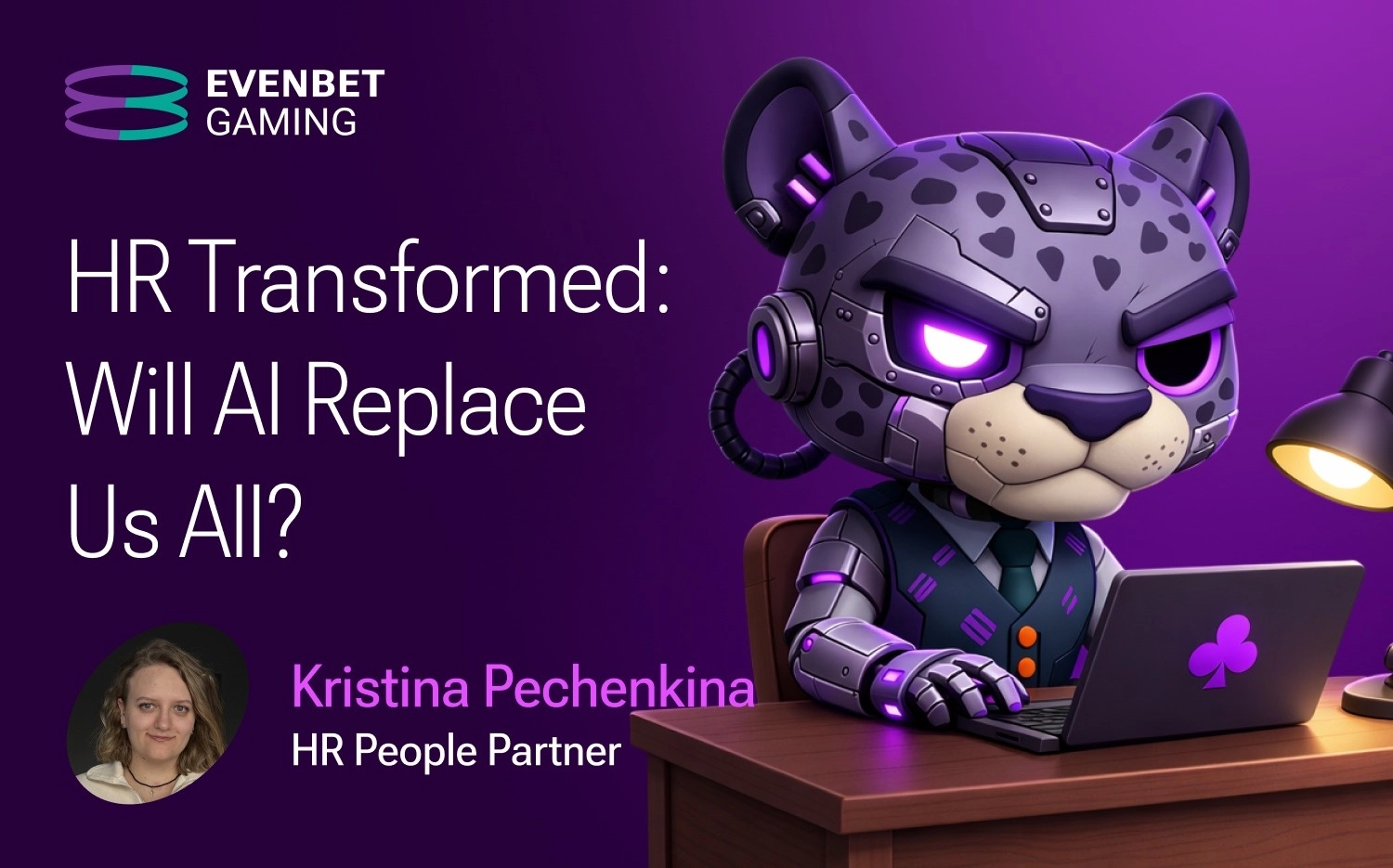Company values are complete nonsense! Or a powerful force that drives business forward? In reality, they can be either — or both — depending on how they’re created and what the company does with them afterwards.
We’ve all seen corporate values reduced to buzzwords on glossy posters: Integrity. Excellence. Innovation. Nice words. But without meaning, without action, they’re just background noise.
At EvenBet Gaming, we knew we didn’t want that. As our team grew and our operations expanded across continents, we realized we needed a shared foundation — something that would help new and seasoned employees alike understand who we are, how we work, and what we stand for.
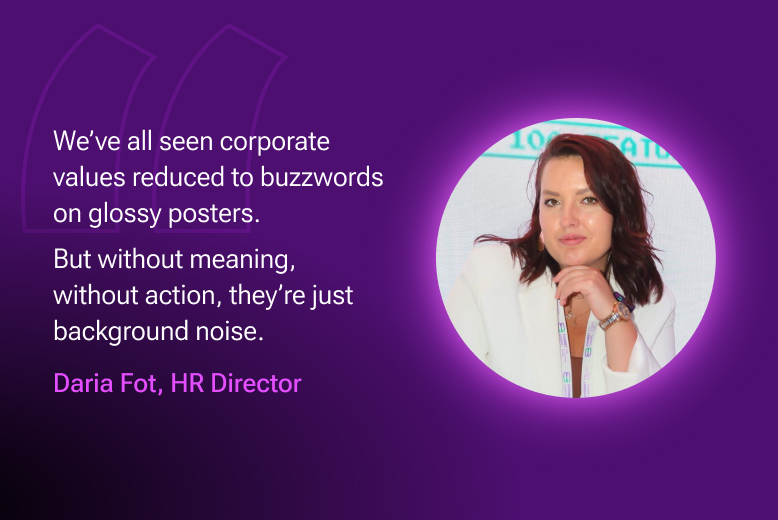
This article is about that journey:
- What company values really are
- Why they matter — especially in fast-growing, remote-first tech teams
- And how we at EvenBet Gaming developed a set of values that reflect both our culture and our ambitions
Whether you’re curious about building company culture, or exploring remote IT jobs, or careers at a global gambling software developer, this story might just give you a new perspective.
What Are Company Values — and Why They Matter
Corporate values are core principles and beliefs that guide how teams behave, make decisions, and collaborate with customers and each other. They’re not formal policies—they’re the internal compass that influences behavior across all levels of an organization.
According to Edgar Schein’s model of organizational culture, values exist between visible artifacts (like logos, office design, and mascot) and deep underlying assumptions (the unspoken beliefs employees hold). Values act as the bridge connecting abstract foundations to everyday behavior.
Studies show that honoring organizational values not only builds engagement but correlates strongly with innovation, excellence, team satisfaction, and external satisfaction.
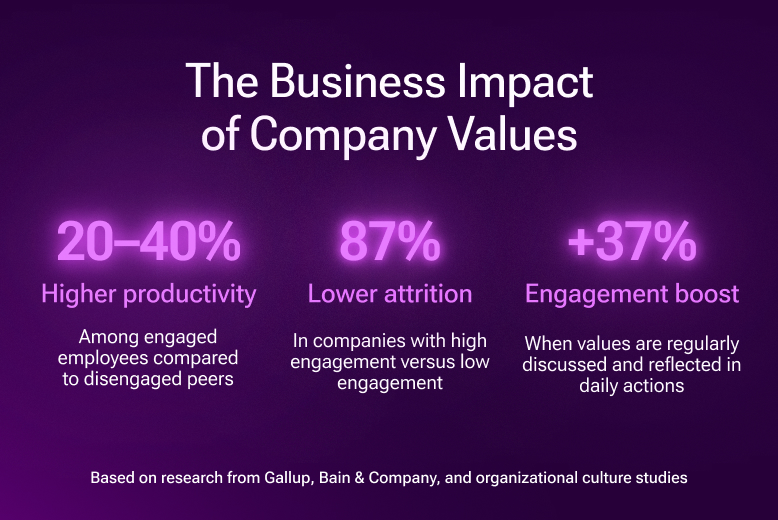
From a strategic standpoint, clearly defined values bring tangible benefits:
- Boost employee engagement and increase productivity by 20–40%
- Reduce attrition rates by up to 87%
- Improve decision-making by aligning teams around shared principles
- Raise engagement by ~37% when values are actively practiced
- Foster psychological safety, encouraging openness, idea sharing, and innovation
For example, Zappos embeds its 10 core values into daily operations, from hiring to customer support. It has driven strong employee loyalty, distinctive brand identity, and sustained growth.
Why We Realized We Needed Company Values
At EvenBet Gaming, the decision to define our company values wasn’t a checkbox exercise — it was a business necessity.
As our CEO Dmitry Starostenkov put it:
Creating company values has become a kind of corporate fashion. Many organizations adopt them not out of true internal need, but simply because business textbooks say they should. That shapes how employees treat them. At best, they forget them. At worst, they mock them. From the start, we were aware of that risk. That’s why we approached this task with caution — making sure we understood why we needed values and how we would actually use them.
So what prompted us to take this seriously?
- Rapid Growth: Over the past two years, EvenBet Gaming has doubled in size. With that growth came an influx of new team members — talented people from diverse backgrounds who didn’t necessarily share the same cultural references or internal intuition that long-time employees had absorbed over the years.
- Remote Job Format: At the same time, most of our team now works remotely, especially those who joined recently. Remote work brings many advantages, but it also has one serious drawback: limited informal interaction. When people don’t spend time together in person, cultural understanding doesn’t pass organically.
These two trends — rapid growth and remote work — led us to a critical realization:
- We could no longer assume that everyone on the team saw things the same way.
- We’re not sure that everyone understands how we work together, why we make certain decisions, or where we’re headed as a company.
We needed a shared foundation — a set of clearly articulated principles that could anchor our culture, guide behavior, and help every team member, new or tenured, understand the “why” behind our choices.
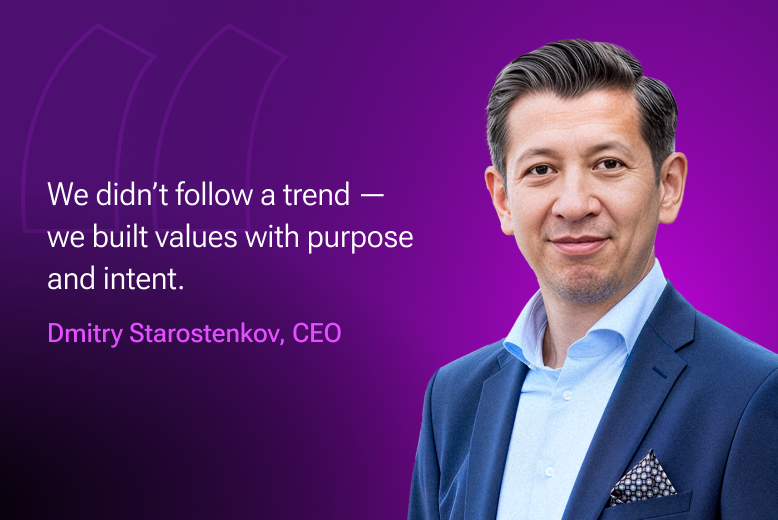
In other words, we needed company values not for appearance’s sake, but as a practical framework to strengthen alignment, build clarity, and empower people to act in the company’s best interest.
Dmitry Starostenkov:
A company’s business advantage doesn’t come from a unique product or a special position in the market — those things can always be copied. Real, lasting competitive advantage comes from internal strength, from the strength of the team: how well it works together, how it attracts and retains top talent, and how effectively it uses those talents.
That’s the mindset we carried into our values project. Not to create slogans, but to define a long-term operating system for how we grow, make decisions, and succeed together — across roles, time zones, and cultures.
Our Approach: Bottom-Up, Top-Down, and Built to Last
There are many ways to define company values — but not all of them lead to values that actually work.
We’ve seen it happen before: leadership drafts a set of values behind closed doors, then announces them to the team as a finished product. On paper, this approach is fast. But in practice, it rarely works.
Hanna Kunkevich, HR Brand Manager:
I’ve seen it many times — company values created by top management and simply announced by the CEO. The only benefit is speed. But when employees aren’t involved, it’s much harder for them to treat the values as their own. That’s why we were willing to sacrifice speed to make sure our values truly resonated with every member of the team.
From the beginning, we were clear on one thing: if values were going to reflect our culture and guide our future, they had to be built by the people who live that culture every day. At the same time, they also needed to align with the company’s direction and goals.
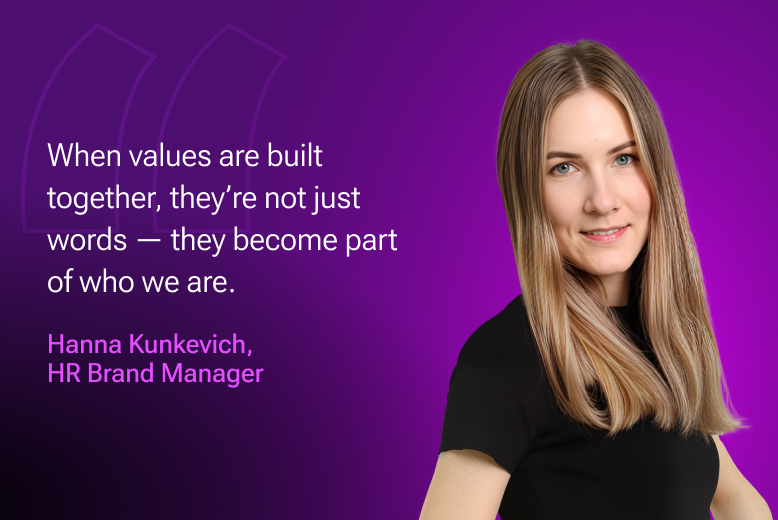
So we defined two core sources for our values:
1. The Team Itself
We started with what we already had — the culture that existed inside EvenBet Gaming. That meant talking to people, analyzing engagement surveys, and listening carefully to how employees describe their experience at work.
This ensured that:
- Everyone could contribute to shaping the values and see their perspective reflected
- The final values wouldn’t contradict the culture we’ve already built, but rather articulate and reinforce it
2. Our Strategic Direction
At the same time, we didn’t want to freeze the status quo. Values shouldn’t just describe where we are — they should help guide us toward where we want to go.
That meant making sure our values:
- Support our long-term goals as a company
- Encourage the kind of behavior and decision-making we want to see more of
- Reinforce our strengths while creating a common language for growth
In other words, we chose a hybrid model:
- Bottom-up, to capture what already works.
- Top-down, to provide strategic clarity and future alignment.
The result? A set of values that feel real to our people and useful to the business — not just inspiring in theory, but actionable in everyday work.
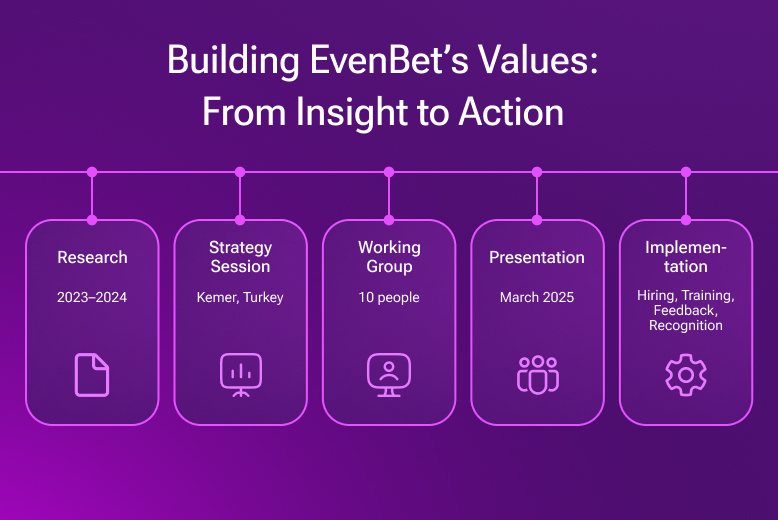
Step 1: Listening Before Defining
We began our work on values not by writing, but by listening.
Throughout 2023 and 2024, we actively conducted employee engagement surveys to better understand how our team perceives EvenBet Gaming — not just in terms of satisfaction or performance, but in terms of culture:
- What do people value most about working here?
- What words do they associate with the company?
- What makes them proud to be part of the team?
- And where do they see room for growth?
This wasn’t a one-time effort. We looked at multiple waves of feedback over time, comparing responses from long-time employees and new hires. This gave us something incredibly valuable. A layered view of how our culture was experienced from different angles and at different stages of growth. Longer-serving team members helped us identify what has made EvenBet strong over the years. Newcomers brought a fresh perspective — and helped highlight what may not be obvious to those who’ve been here longer.
These insights became our starting point. They allowed us to see both the strengths worth preserving and the gaps worth addressing. Before we ever put pen to paper, we had a clear sense of what kind of company our people believed in — and what kind of culture they wanted to keep building together.
Step 2: Strategic Direction and Leadership Vision
In the second half of 2024, we gathered in Kemer, Turkey, for a strategic offsite that brought together our C-level executives and key team leaders from across the company. The goal wasn’t just to align on business plans — it was to look deeper and define the kind of company we wanted to become.
As part of this session, we focused on something fundamental: how to create a stronger sense of shared direction and identity across our growing, distributed team.
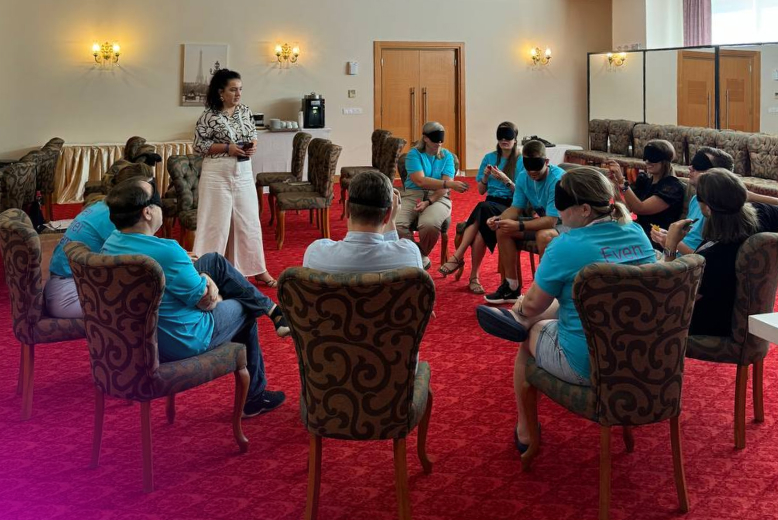
Out of that conversation came the first version of our values — early, high-level formulations grounded in the insights we had gathered from employee surveys and team feedback. These weren’t finished statements. They were broad, reflective drafts: rich in nuance, layered with intention, and full of leadership perspective.
But we knew that wasn’t enough.
While these drafts captured the strategic vision of the company’s future, they still needed something critical: the voices and insights of the people who would actually live those values day to day.
So the next step was clear. We needed to bring in people from across the business — not just to validate what we had, but to shape it, challenge it, and bring it to life.
Step 3: Cross-Team Working Group
After the strategic session, we moved to the most collaborative part of the process: forming a working group to shape the values from the inside out.
Hanna Kunkevich, HR Brand Manager:
We assembled a team of 10 people representing the very departments these values would affect — commercial, account management, marketing, and technical. The group included both long-time employees and newcomers, so we could blend deep company knowledge with fresh perspectives.
This was deliberate. We wanted to make sure our values wouldn’t just reflect leadership’s vision — but would genuinely capture how people across EvenBet work, think, and collaborate.
The group received the preliminary drafts from the strategy session and set out to turn them into something clear, powerful, and usable. The goal was to create concise, memorable formulations that accurately described:
- How we work with clients
- How we work with each other
- And how we want to grow — both individually and as a team
But powerful values don’t live in abstraction. They only matter when they translate into action.
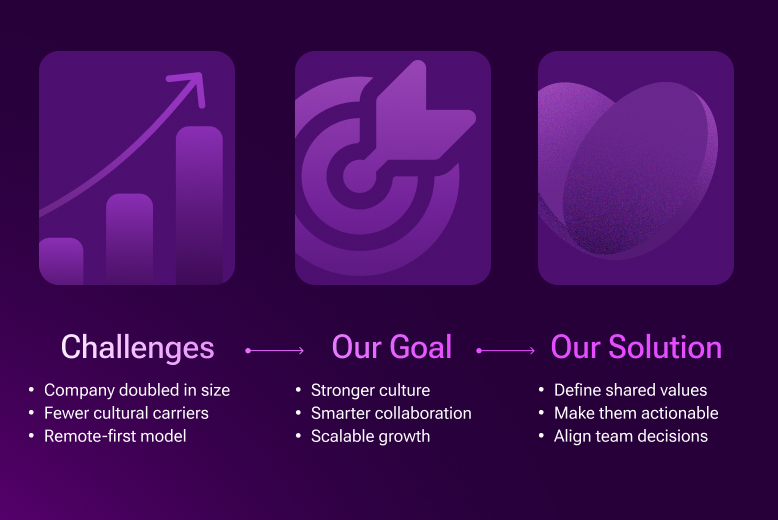
To make this real, each working group member was asked to contribute three concrete examples of behaviors that reflect each value. In addition, they provided “anti-examples” — what it looks like when someone acts in a way that contradicts a value.
These examples helped us develop behavioral indicators: clear, observable signals that show whether a team or an individual is living the values in practice.
This approach ensured our values wouldn’t become empty statements on a slide or a poster. Instead, they became a working code — a guide to decision-making, communication, and collaboration at EvenBet Gaming.
Step 4: Presenting the Values to the Team
Once the values were finalized, we brought them to life — both visually and culturally.
Our design team created a visual identity for the values that aligned with our brand and internal tone. But more importantly, we focused on how to introduce them to the entire company in a way that felt personal, collaborative, and grounded in reality.
We organized an interactive all-hands presentation to unveil the values to the team. But this wasn’t a typical top-down rollout. The values weren’t presented by executives. They were introduced by the people who helped shape them — members of the working group who had been involved in every step of the process.
This choice was intentional. When team members share what they helped create, it immediately gives the message more credibility and meaning.
During the presentation, we asked employees to share their own associations with EvenBet Gaming — and turned the results into a real-time word cloud. The results were striking: the words our team used to describe the company closely matched the spirit of the values we had defined. It was a moment of validation — and proof that we had created something that resonated.
Each presenter not only read the value statements but also shared real examples:
- How these values had already shaped their work
- What kind of behaviors reflected them
- And how they planned to use the values going forward
By doing this, we avoided the classic pitfall of values being seen as abstract or theoretical. Instead, the team saw them in context — as something real, lived, and relevant to their daily choices.
The Result: Three Values That Define Who We Are
After months of listening, reflecting, and co-creating, we arrived at a set of values that are both true to our culture and bold enough to shape our future. We chose clarity over volume — three values, each deeply connected to how we work, how we grow, and how we build relationships.
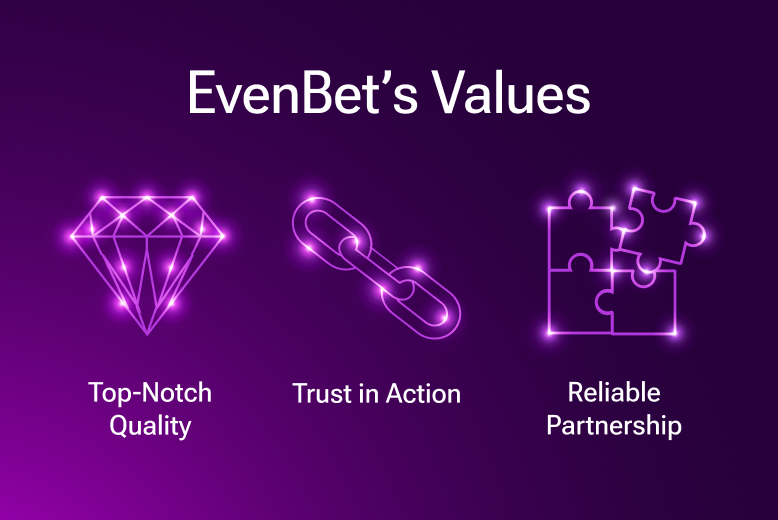
These are not abstract ideals. They are tools: for collaboration, decision-making, communication, and leadership. Each value is supported by real-life behaviors, examples, and feedback from our team.
1. Top-Notch Quality
We create products and services we are proud of. We work as a united team, pay close attention to detail, and keep our commitments.
We believe quality is not just the outcome — it’s the mindset behind everything we do. From product decisions to communication, we strive for excellence, together.
What it looks like in practice:
- Thinking one step ahead: If a customer chooses an ineffective solution, we don’t just say yes — we offer better alternatives, even if they require more effort.
- Creating a product people want to use: Our partners don’t stay with us out of necessity — they stay because our solutions genuinely move their business forward.
- Going beyond “acceptable”: We never settle for “good enough.” We refine, test, and improve until we’re confident in the result.
- Taking pride in our work: We’re proud to share what we’ve built — on social media, with friends, or with potential clients.
2. Trust in Action
We foster an atmosphere of trust through honesty, openness, and mutual support.
Trust is something we build through consistency, transparency, and responsibility. It’s how we work with each other, how we communicate with clients, and how we navigate complexity.
What it looks like in practice:
- Taking responsibility for mistakes: When something goes wrong, we don’t hide it — we inform the team, fix it together, and learn from it.
- Keeping commitments and addressing risks: If we see we’re going to miss a deadline or need help, we speak up early and offer solutions.
- Speaking up — even when it’s uncomfortable: We don’t avoid hard conversations. We talk through issues, risks, or disagreements with honesty and respect.
- Relying on the team: We ask for help when we need it and offer support when others need it. We know who to turn to — and when.
Dmitry Starostenkov:
Sometimes I see team leads or colleagues launch initiatives I don’t fully agree with. My first instinct might be to step in and say, ‘That’s not how it should be.’ But acting on that impulse would destroy the spirit of partnership. As a leader, I have to trust my team — let them test ideas, make mistakes, and learn. I can offer guidance and feedback, but I must not shut things down just because I think I know better.
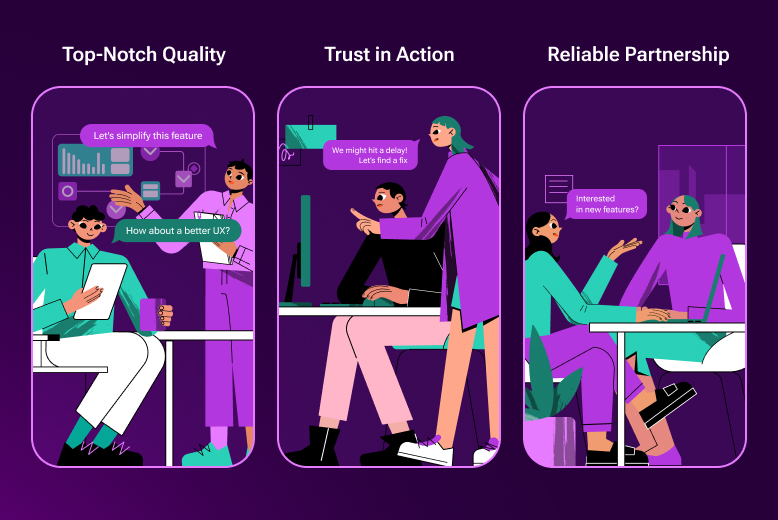
3. Reliable Partnership
We are a reliable partner for clients and colleagues, honoring commitments with quality and timeliness, and building trust-based, long-term relationships.
We see partnership not as a transaction, but as a shared journey. Internally and externally, we strive to be the kind of partner people trust — and want to work with again.
What it looks like in practice:
- Working toward shared outcomes: We back each other up, share the workload, and celebrate results together.
Kristina Pechenkina, HR People Partner:
We regularly collect feedback from new hires at the end of their onboarding. One thing they consistently mention is how strong the culture of support is. If someone struggles or has a question, they can always ask — and someone always helps. No one’s obligated to do it, but it’s part of who we are. And we’re proud of that.
- Meeting deadlines and supporting colleagues: We stay on schedule — and we step in when others need help doing the same.
- Keeping promises: We follow through — and we value when our partners and teammates do the same.
- Caring about our partners’ growth: We proactively seek ways to improve our clients’ business, bring new ideas, and build long-term success.
Nikita Golodaev, Business Account Manager:
Last year, we noticed some of our top-performing projects weren’t requesting many new features — just minor updates. We asked ourselves: What if they simply don’t know what’s possible? We ran a deep analysis of one such project — its history, its market, its competitors. Then we came back with a tailored proposal. The partner loved it — not just the ideas, but the initiative. Since then, we’ve met regularly to plan the next stages of their project. That’s what ‘Reliable Partnership’ means to us — and we’re now applying this mindset to all our accounts.
Making Values Part of Daily Work
Too often, corporate values are launched with a splash — and then quietly shelved, forgotten after the presentation is over. We were determined to avoid that path.
Since the values were introduced in March 2025 — just a few months before this article was written — we’ve been focused on one thing: integration. Our goal is simple but ambitious. We want these values to live not just in slides and speeches, but in the way we hire, communicate, collaborate, and grow.
Here’s how we’ve already started embedding our values into everyday work:
Hiring and Onboarding
We now deliberately seek candidates who naturally resonate with our values. During interviews, we assess not only professional experience but also how well candidates align with the way we work and think. And once they join us, we show them how the values are lived — not just explained.
Training and Communication
In May 2025, we held a company-wide training on effective communication. It was grounded in our values — particularly trust and partnership — and focused on how to apply them in day-to-day interactions. The goal was to make team communication more open, supportive, and effective.
360° Feedback
We’re launching a company-wide 360-degree feedback system. Every employee will provide input on colleagues they work with regularly — including feedback on how well each person reflects our corporate values in action. The results, anonymized and summarized, will help each team member reflect, grow, and adjust their approach.
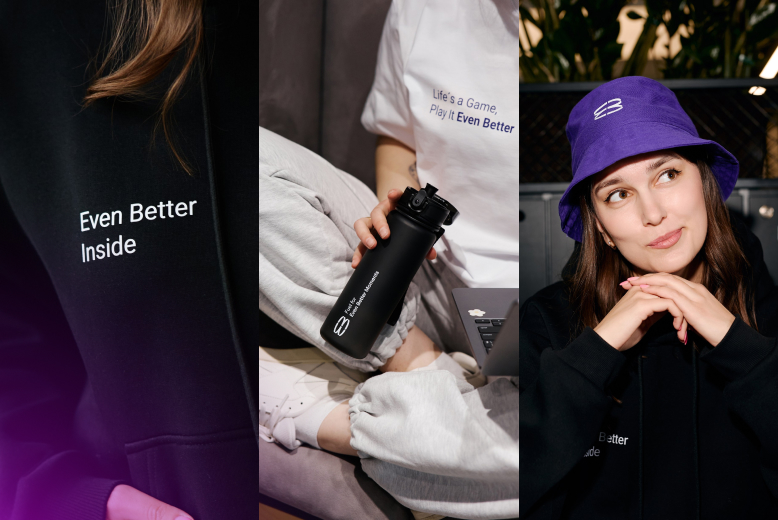
Recognition and Motivation
We’re in the process of launching a peer recognition system designed to bring our values to life in a visible, meaningful way.
Soon, employees will be able to thank colleagues for actions that embody one of our three core values. These moments of recognition won’t just feel good — they’ll also be rewarded. Each acknowledgment will earn the recipient points they can exchange for items in our internal merch store.
This initiative is more than just a feel-good program. It’s a tool to keep our values front and center — reinforcing the behaviors that make EvenBet Gaming stronger, one real-life example at a time.
Celebrating Values in Success
In the future, we won’t just recognize outstanding results. We’ll also celebrate the way those results are achieved. Actions that embody our values — like helping a teammate under pressure, going the extra mile for a partner, or taking responsibility in a difficult moment — will be publicly acknowledged as success stories in their own right.
Weaving Values into Culture
And finally, we’re gradually integrating our values into the rhythms of company life: from internal events and team rituals to how we share updates, set goals, and reflect on achievements. Over time, our values will become second nature — a cultural constant, not a corporate campaign.
What It All Comes Down To
At EvenBet Gaming, we didn’t create corporate values to follow a trend or fill a slide deck. We created them because we needed a shared foundation — something that could unite our growing, global team and help us move forward with clarity and purpose.
We launched these values with real stories, real examples, and real voices — not as slogans, but as tools.
And now we’re focused on implementation in hiring, onboarding, training, peer feedback, recognition, and daily teamwork. The work is just beginning, but the direction is clear — our values are here to stay, and they’re already starting to shape our decisions and culture.
If these values resonate with you — if you believe in building great products, working with integrity, and growing through collaboration — we’d love to hear from you.Check out our open positions and find out how you can be part of a company where values don’t just live on paper — they live in everything we do.





 Upd: 24 September 2025
Upd: 24 September 2025 






